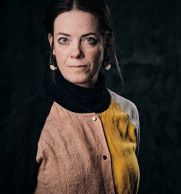Keynote Speakers
Monica Greco

Monica Greco (BA, MA, PhD) is Professor of Sociology at the University of Bath, UK. Working at the intersection of the history and philosophy of medicine, science and technology studies (STS), and medical sociology, Monica has made significant contributions to the critical analysis of knowledge practices in psychosomatic medicine. Her work articulates the broader social and political implications of different ways of conceiving health and illness, as well as different ways of naming, classifying, and explaining. Monica has published widely on these topics throughout her career, including the monograph Illness As a Work of Thought (Routledge, 1998) and a guest-edited special issue of BMJ Medical Humanities on ‘Biopolitics and Psychosomatics’ (2019).
Monica Greco will be keynote speaker in relation to Theme 1: What is a symptom?
Keynote presentation: Symptoms and the question of meaning: a Pandora's box?
The question of whether symptoms have meaning, and how their meaning should be interpreted for medical purposes, has been a recurrent theme in the history of psychosomatic medicine. This question effectively distinguishes psychosomatic medicine from modern biomedicine, where symptoms appear meaningful only as potential indicators of disease. Medical epistemologies do not only serve medical purposes but also mediate social expectations, legitimacy, and attributions of responsibility. As new forms of knowledge begin to reconceptualise symptoms as complex, dynamic phenomena in their own right, we are witnessing a shift in their epistemological status. This raises an important question: if we change how we understand what symptoms signify, how might this reshape the social relations they structure?
Kate Hunt

Kate Hunt is a professor at the University of Stirling and her research experience and interests have covered a wide range of areas including: gender, health, health behaviours and help-seeking; experiences of health and illness; commercial/media influences on health; designing and evaluating gender-sensitive interventions; using community settings (e.g. professional sports clubs) to deliver novel and appealing health interventions; evaluation of policy change within the Scottish prison service; prisoner health; people's experience of illness (including long Covid).
Kate Hunt will be keynote speaker in relation to Theme 2: Symptoms in Society.
Keynote presentation: This content is currently being updated. Please check back later.
Rani Lill Anjum

Rani Lill Anjum is Research Professor of Philosophy at the Norwegian University of Life Sciences. She led the 4 year research project, CauseHealth, and works on philosophy of science and medicine.
Rani Lill Anjum will be keynote speaker in relation to Theme 3: Understanding 'risk factors' and 'causes' in the development of symptom persistence.
Keynote presentation: CauseHealth: Rethinking causality, complexity and evidence for the unique patient
All sciences, including health science, comes with a number of philosophical assumptions, what we call ‘philosophical bias’: basic implicit assumptions in science. For instance, with the introduction of the evidence-based framework in the 1990ies, evidence of causes and risks took a clear quantitative turn. The adopted notions of cause, probability and risk motivated a strong emphasis on big data sets, large population studies, statistical approaches and risk factors. In the CauseHealth project, we started instead from a different set of assumptions: that causality, probability and risk are qualitative in nature and therefore require more qualitative approaches. This philosophical framework focuses instead on individual dispositions, causal complexity, local variations and context-sensitivity. A new way to model causality as vectors is briefly introduced to illustrate some of these features.
Chris Burton

Chris Burton is Professor of Primary Medical Care at the University of Sheffield. His main research and clinical interest is in persistent physical symptoms but his work extends to broader issues around the intersection of physical and mental health. His work focuses on the interpersonal aspects of care including involving the processes of diagnosis, explanation and reassurance. Chris recently led Multiple Symptoms Study 3, a large trial of an extended role GP consultation intervention for persistent physical symptoms.
His research involves a range of approaches including evidence synthesis, analysis of routine healthcare data, qualitative analysis and the development and evaluation of interventions. He has a longstanding interest in the application of complexity science to illness and healthcare. He leads the Primary Care Research group within the School of Medicine and Population Health at the University of Sheffield.
Chris worked for many years as a GP in a rural former coal-mining community in the SouthWest of Scotland. He completed his doctorate at the University of Edinburgh and was a Senior Lecturer in Primary Care at the University of Aberdeen before moving to Sheffield in 2017.
Chris Burton will be keynote speaker in relation to Theme 4: Management and alleviation of symptoms.
Keynote presentation: Persistent symptoms in medical conditions: what can we do better?
Persistent physical symptoms (including pain and fatigue) are common after optimal treatment of many long-term medical conditions. They provide challenges for patients and for clinicians. This talk will explore these challenges and suggest ways that persistent symptoms can be understood, explained and sometimes managed.
Marie Højlund

Marie Højlund is a composer, sound artist, and associate professor of Sound Studies at Aarhus University. Her research explores sonic citizenship through practice-based approaches, focusing on soundscapes where boundaries between private and public, individual and community become blurred—such as in hospitals. She investigates how attuning practices can foster inclusion and raise questions of voice, privilege, and belonging. As a composer, she has created works for theatre and television and released several albums. In 2023, she was honored with the Carl Nielsen and Anne Marie Carl-Nielsen Award, one of Denmark’s most prestigious recognitions for composers.
Marie Højlund will be the closing keynote speaker.
Keynote presentation: Listening as Care: Sonic Citizenship and the Sensory Politics of Symptoms
In this keynote, I explore symptoms not merely as internal signals, but as embodied phenomena shaped through sensorial mediation—especially sound. Drawing from interdisciplinary perspectives across sound studies, medical humanities, anthropology, and artistic practice, symptoms are understood as felt, interpreted, and communicated through multisensory environments—through rhythms, atmospheres, and relational attunements.
I propose that by cultivating awareness of sonic and sensory attunements, we can become active sensory citizens—participants in shared sensory environments—who resist the isolating effects of fear and estrangement, and instead foster relational presence, embodied agency, and mutual care.
Focusing on healthcare spaces such as hospitals, I examine how soundscapes, visual atmospheres, tactile surfaces, and spatial arrangements modulate the experience of symptoms. Central to this inquiry is the concept of sonic citizenship—the idea that individuals participate in shared sonic environments not only as passive receivers but as active co-creators of meaning, care, and presence. Sonic citizenship foregrounds listening as a relational and ethical practice, one that can transform clinical encounters and care environments into spaces of attunement and mutual recognition.
As the closing keynote of SymPCa 2026, this presentation aims to broaden the epistemological palette of symptom research, inviting participants to consider aesthetic, affective, and participatory dimensions of care. It opens a conversation for future inquiry: How can interdisciplinary collaborations between clinicians, researchers, artists, and patients reshape our understanding of symptoms—and the spaces in which they unfold?